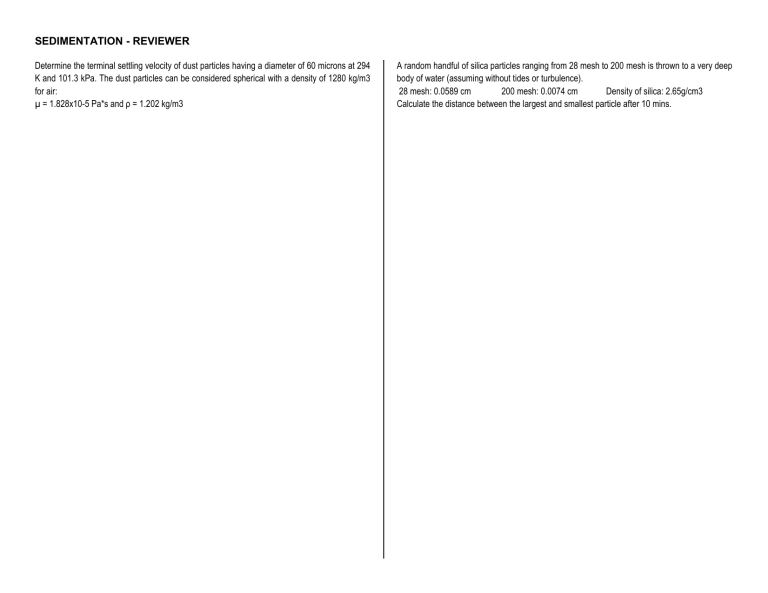
SEDIMENTATION - REVIEWER Determine the terminal settling velocity of dust particles having a diameter of 60 microns at 294 K and 101.3 kPa. The dust particles can be considered spherical with a density of 1280 kg/m3 for air: µ = 1.828x10-5 Pa*s and ρ = 1.202 kg/m3 A random handful of silica particles ranging from 28 mesh to 200 mesh is thrown to a very deep body of water (assuming without tides or turbulence). 28 mesh: 0.0589 cm 200 mesh: 0.0074 cm Density of silica: 2.65g/cm3 Calculate the distance between the largest and smallest particle after 10 mins. SEDIMENTATION - REVIEWER The terminal settling velocity in water at 70°F of a particle without a specific gravity of 2 and diameter of 100 microns is ____. Solid spherical particles of coffee extract from drying having a diameter of 400 micrometer are falling through air at a temperature of 422 K. The density of the particles is 1030 kg/m3, the pressure is 101.32 kPa. Calculate the distance of fall in 5s. SEDIMENTATION - REVIEWER In a mixture of density 2650 kg/m3 and gollena of density 7500 kg/m3, the sizes of the particles range from 0.005 to 0.025. On separation in a hydraulic classifier under free settling conditions, three fractions are obtained, one consisting of quartz only, one a mixture of quartz and galena, and one of the only. What are the range of sizes of particles of the two substances in the original mixture? Solid spherical particles having a diameter of 0.09 mm and a solid density of 2002 kg/m3 or settling in a solution of water at 26.7 °C. The volume fraction of the solids in the solution is 0.45. The settling velocity is ____. For H2O: ρ = 994.7 kg/m3 μ = 0.861 Pa-s. SEDIMENTATION - REVIEWER A glass sphere in water at 68°F contains 1260 g of glass spheres in 1140 cm3 of total volume . The average diameter of the spheres , as determined from photomicrographs , was 0.061 in and the true density of the spheres was 154 lb/ft3. For water at 68°F, the density is 62.2 lb/ft3 and viscosity is 6.72x10^-4 lb/ft-s. The terminal velocity in ft/s for the hindered settling is A laboratory test on a suspension of a solid in a liquid gave the following information: Original height of the sludge before settling 10 in Free settling rate 0.10 in/min Height of the sludge at the end of the free settling period 6.5 in Height of the sludge at the end of 120 min 4 in Height of the sludge when completely settled 1.5 in One thousand cubic feet of similar sludge is to be settled in a vertical cylindrical tank , the diameter which is equal to the depth of the liquid suspension in it. calculate the time it would take for the solid to settle to a height of 20 % of original height of the sludge. SEDIMENTATION - REVIEWER Free settling of sludge is 0.25 cm/min. Using an original height of 25 cm, the sludge settled to a height of 18 cm after the free settling period. The sludge was found to settle to a height of 10 cm after 110 min. This particular sludge was found to settle completely to a height of 4 cm. The time to settle to a height of ⅕ of its original height in a cylindrical tank whose diameter is 85% of its depth if its 85% full and consider 1000ft^3 of sludge in the tank is Square mica plates, 1/32 inch thick and 0.01 sq. inch in area are falling randomly through oil with a density of 55 lb/ft^3and with viscosity of 15 centipoise . The specific gravity of the mica is 3.0, the settling velocity is SEDIMENTATION - REVIEWER SEDIMENTATION - REVIEWER SEDIMENTATION - REVIEWER SEDIMENTATION - REVIEWER SEDIMENTATION - REVIEWER

